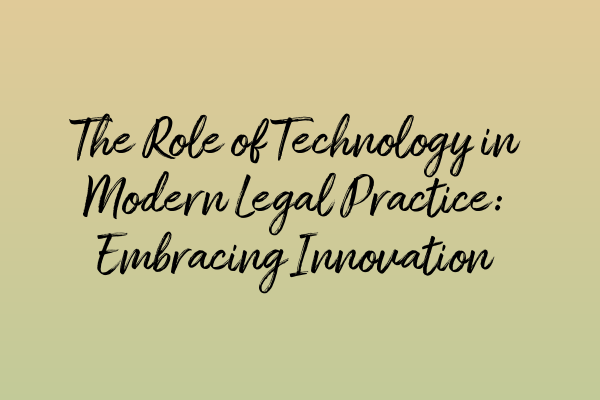The Role of Technology in Modern Legal Practice: Embracing Innovation
In today’s digital age, technology has revolutionized every industry, and the legal profession is no exception. With the rapid advancements in technology, law firms and solicitors have had to adapt and embrace innovation to stay competitive and deliver better services to their clients. In this article, we will explore the role of technology in modern legal practice and how it is transforming the way solicitors work.
1. Increased Efficiency and Productivity
Technology has significantly improved the efficiency and productivity of legal professionals. With the advent of case management software, solicitors can now manage and organize their cases more effectively. These software systems allow for seamless document management, task tracking, and collaboration among legal teams. By streamlining processes and automating repetitive tasks, technology enables solicitors to focus on more complex legal work, saving both time and effort.
2. Research and Analysis
Legal research is a critical aspect of the legal profession. Technology has made it easier for solicitors to access vast amounts of legal information and research materials. Online legal databases and search engines provide quick and accurate results, allowing solicitors to analyze precedent cases and statutes more efficiently. Additionally, AI-powered legal research tools can assist in finding relevant case precedents and legal arguments, further enhancing the speed and accuracy of research.
3. Collaboration and Communication
In the past, collaborating and communicating with clients and other legal professionals often involved time-consuming meetings and exchanges of physical documents. Technology has transformed this process by introducing virtual communication and collaboration tools. Video conferencing, instant messaging, and cloud-based document sharing platforms enable solicitors to connect and collaborate with clients and colleagues from anywhere in the world. This not only saves time and travel costs but also enhances the overall client experience.
4. Enhanced Client Services
Technology has revolutionized the way solicitors deliver services to their clients. Client portals and online case management systems allow clients to access real-time updates on their cases, securely upload documents, and communicate with their solicitors more conveniently. Furthermore, chatbots and AI-powered virtual assistants can provide clients with instant responses to frequently asked questions, reducing the need for human intervention and improving client satisfaction.
5. Improved Document Management and Security
Managing and storing documents securely is a crucial aspect of legal practice. Technology has provided advanced document management systems that enable solicitors to store, organize, and retrieve documents more efficiently. Cloud storage solutions offer secure and remote access to files, eliminating the risk of physical document loss or damage. Furthermore, encryption and data protection measures ensure the confidentiality and integrity of sensitive client information.
6. Expanding Legal Services
Technology has opened up new opportunities for solicitors to expand their legal services. Online legal services platforms have emerged, offering affordable and accessible legal advice to individuals and small businesses. These platforms utilize technology to match clients with solicitors based on their legal needs and provide a cost-effective alternative to traditional face-to-face consultations. Additionally, technology has enabled solicitors to reach a wider audience through digital marketing and virtual legal seminars.
Embrace Innovation and Stay Ahead
As technology continues to advance, it is crucial for solicitors and law firms to embrace innovation and adapt to the changing landscape of legal practice. By leveraging the power of technology, solicitors can enhance their efficiency, improve client services, and stay ahead of the competition. The integration of technology into legal practice is not only beneficial for solicitors but also for clients, who can enjoy more accessible, efficient, and cost-effective legal services.
If you’re interested in learning more about the legal profession or preparing for the qualifying solicitors examination (SQE), be sure to check out these related articles:
- SQE Prep Made Easy: Strategies and Resources
- SQE Prep: Tips and Tricks to Excel in Criminal Law
- Terrorism and Criminal Law: Balancing National Security with Justice
- Cross-Examination Techniques: Mastering the Art of Questioning
- Private Prosecutions: Exploring Non-Governmental Prosecutions in Criminal Cases
By staying informed about current trends and developments in the legal profession, you can position yourself for success and make the most out of the technological advancements that are shaping the future of legal practice.


Leave a Reply